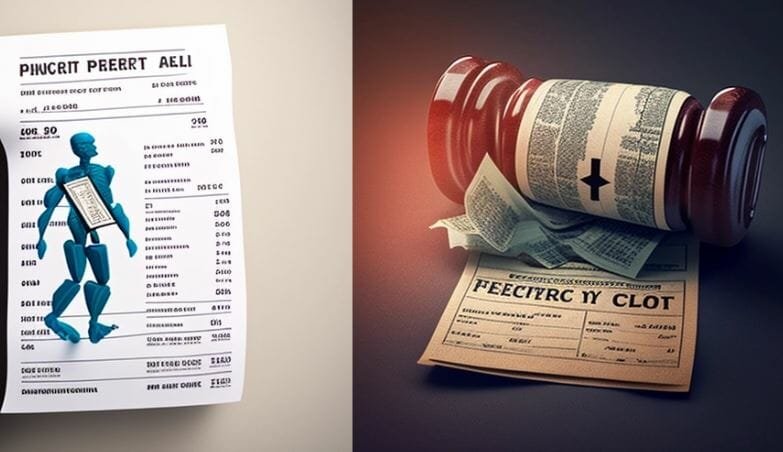Hiring a personal injury lawyer is essential when you are accused or hurt by third-party fault. These attorneys prepare a lawsuit with a legit demand package for your recovery. However, most people wonder what the fee structure of a personal injury lawyer is. It’s simple. Most injury attorneys take a “contingency fee” or a certain percentage of your final settlement. So What Percentage Do Lawyers Take For Personal Injury? It depends on 33% to 40% of your total recovery amount. However, the fees can also vary depending on the case’s difficulty, how long it’s taking, and other circumstances.
Some attorneys prefer a 25% cut out from your final settlement. Only if the case is settled by negotiation with the insurer means your case doesn’t reach civil court. Similarly, this contingency fee can go above 35%-40% if out-of-the-box hustles come to your lawyer. Generally, this fee structure gives you the advantage of paying a dollar once you get a final settlement.
Contingency Fee Percentage
As mentioned, personal injury lawyers take a Contingency Fee on your case. It is a determined percentage that is cut out from your final composition. The fee mainly depends between 33%-40% on your recovery amount. For example, $10,000 became your final compensation after winning the case. So your attorney takes $3300-$4000 as a fee for your case. By allowing this fee structure, you can reduce charges that mainly require hiring other attorneys. In a personal injury case, you only need to pay a dollar once you get the legit settlement. Still, you have to negotiate with the attorney to reduce the Contingency Fee from your case.

Additional Costs And Expenses
Personal injury lawyers may take a predetermined percentage from your recovery amount. Still, additional charges always come during an ongoing accident case. These are the expenses that your lawyer pays during the investigation. As a result, your attorney may add the expenses to the Contingency Fee or your final settlement amount. Additional costs and expenses mainly follow
- Payments to collect Medical reports and police reports
- Witness fees
- Court filing expenses
- Investigation costs and others
So win or lose, you have to pay these additional charges paid by your attorney. In this case, you should collect all vital evidence from cutting down on the other expenses. Besides, ensure the Contingency Fee agreement already determines the fee percentage before calculating additional charges.
How Do Lawyers Get Paid For Personal Injury Cases?
When your injury lawyer agrees on Contingency Fee, the settlement check directly goes to them. After that, your lawyer will deposit the check in a particular account. If any liens against your settlement or unpaid bills remain, the lawyer will pay from your side. These expenses are unpaid bills of health providers, insurers etc. After calculating the costs and Contingency Fee, the final recovery amount is sent to your bank account. For example, your final settlement amount is $10,000, the Contingency Fee is 33%, and unpaid bills are $1000. So you get $5700 as a final compensation after paying your lawyer.
Are you wondering how much a lawyer might take from a personal injury case? It’s a tricky question, and the answer will depend on lots of factors. In this blog post, we’ll explore the various ways that lawyers price their services and what percentage to expect for a personal injury claim. Read on to learn all you need to know about getting representation for your case!
What Is The Difference Between A Contingency Fee And An Hourly Rate?
Lawyers who specialize in personal injury cases typically use a contingency fee to pay for their services. This means that the lawyer will not be paid an hourly rate for their services but instead, will receive a percentage of any settlement or award awarded. Contingency fees vary from state to state, but generally speaking, they range from 33% to 40%. When it comes to cases involving serious injuries, or a great deal of legal work required by the lawyer, percentages are often higher.
Hourly rates may be used if a lawyer insists upon payment up-front before starting work on your case or if the case requires court appearances and significant time commitments. In these cases, lawyers usually charge $150-$350 per hour and there is no guarantee that any success fees obtained through settlement offers or by presenting a winning argument in court will outweigh the sum of money you must spend on legal fees. It is important to discuss these matters with your attorney before signing any agreement so that you understand what rate applies under what circumstances.
What Are The Most Common Types of Personal Injury Cases?
Personal injury cases involve any type of physical or emotional injury caused by another’s negligence or intentional acts. Personal injury lawsuits seek compensation for damages incurred as a result of the accident, including medical expenses, lost wages and pain and suffering.
The most common types of personal injury cases include:
- Motor vehicle accidents, often stemming from recklessness or negligence on the part of the driver, such as running a red light or failing to yield the right-of-way. These types of claims may also arise from an equipment malfunction like faulty brakes or headlights.
- Workplace injuries, when an employee is injured on the job due to their employer’s negligence or improper safety procedures.
- Medical malpractice claims, based upon errors committed by a medical professional that results in harm to their patient.
- Product liability claims, involving the sale of faulty products which can cause harm when used according to their intended purpose.
It is important for people who are experiencing physical or emotional injuries due to someone else’s actions to contact a qualified personal injury lawyer who is familiar with their state laws and understands how best fight for fair compensation from all liable parties. A reputable attorney will have flat fees instead of taking a percentage and will discuss all payment options with you ahead of time in order to ensure that you understand what you are getting into before committing to representation.
How Much Does A Personal Injury Lawyer Charge?
When deciding whether to hire a personal injury lawyer, one of the most important factors is the amount of cost involved. Most personal injury lawyers will provide a free consultation. This helps the injured person get an understanding of the legal process and to find out if they have a case worth pursuing. If they decide to move forward, the lawyer will then calculate their fee based on the amount of time and resources expended on the case.
The two most common types of fee arrangements are contingency fees and hourly rates. With a contingency fee arrangement, a lawyer will usually charge 33% or 40% of compensation awarded for your injury claim, which is payable only if your law firm obtains a favorable outcome for you. Contingency fees serve as an incentive for lawyers to work hard and negotiate for maximum settlement awards on their clients’ behalf.
With an hourly rate, lawyers charge an agreed-upon hourly rate that you pay whether or not any compensation is awarded in your case. Your local state bar association can help you determine typical contingency and hourly rates in your area so that you can be sure you’re getting fair value from your attorney’s services.
How Much Does A Personal Injury Lawyer Make?
Personal injury lawyers typically take around 33 percent of the settlement that their clients receive after a successful lawsuit. This payment structure is known as a “contingency fee.” It means that you will not have to pay anything upfront. After a satisfactory settlement, the lawyer will receive one-third of the amount received by the client on top of reimbursing any fees associated with filing the claim or taking legal action on the claimant’s behalf.
In addition to this contingency fee, some lawyers may also charge additional fees for other services rendered such as administrative costs or research costs related to a case that may not be factored into the overall percentage taken by his or her firm. It is important to inquire about what type of services, if any, are included in your particular agreement and to seek further information about how these additional services can be priced separately from your contingency fee if necessary.
What Are The Risks of Hiring a Personal Injury Lawyer?
Hiring a personal injury lawyer is usually seen as a wise course of action for those suffering from an injury due to someone else’s negligence. However, potential clients should be aware of the issues that can arise when using legal representation. These can include the disagreement between lawyer and client over the handling of a case, excessive costs or fees, and potentially unethical behaviour.
It is important to understand how much a personal injury lawyer will cost before hiring one. Generally, lawyers work on what is known as a “contingency fee basis“. This means that they will typically charge anywhere from twenty five to forty percent of whatever settlement or verdict that is obtained by the case. It is important to note that these fees will not come out of any settlement or verdict awarded, but rather are taken out separately.
Due to this percentage based fee structure, it is sometimes discouraged to pursue cases which involve small amounts of money because due to the time and effort being put in by lawyers it may not be worth their time.
Above all else however, it should be noted that there are risks associated with hiring a personal injury lawyer and knowing what those risks are prior to committing oneself can be beneficial for avoiding disappointment down the line.
How Can I Find a Good Personal Injury Lawyer?
Finding a good personal injury lawyer can be a difficult task. It is best to research and interview attorneys to determine which one will be the right fit for you and your case. When filing a claim, it is important to have an attorney who has the experience necessary to handle your claim aggressively and efficiently, while still providing the personal attention needed for a successful outcome.
The first step in finding an attorney is to talk with family, friends or co-workers who may have had recent success with similar claims. After doing some background research, you should narrow down attorney choices based on their credentials, experience, knowledge and history of successful cases like yours. While speaking with attorneys or researching their background on the internet be sure to review reviews from former clients as well as information on their websites about their specific practice areas.
Once you have determined which attorneys you would like to meet for consultations, prepare questions that will help assess each attorney’s qualifications; such as years of practice in personal injury law and what percentage they take out of your recovery funds (commonly known as contingency fees). Then schedule individual free consultations with each attorney and make sure that he/she listens closely to your case before giving any advice since they can only give personalized advice after understanding all the nuances related to your particular situation. Lastly, select an attorney whose expertise best meets your needs while also providing respect and excellent communication skills; these qualities help ensure that both parties can easily work together so that the case is resolved quickly. With these tips in mind – you are now ready set off on the journey towards getting a good lawyer!
What Should I Expect From My Personal Injury Lawyer?
If you have been injured as a result of another’s negligence, you may be considering hiring a personal injury lawyer to represent you in court. It is important to understand what services your lawyer will provide and what percentage of your total damages the lawyer will take for their services. This guide provides an overview of the role of a personal injury lawyer and what to expect from your legal representation in terms of fees and payment.
A personal injury lawyer is responsible for providing advice, counsel, and legal representation on behalf of an individual who has suffered an injury due to negligence on the part of another party. The lawyer’s goal is to ensure that the injured party receives fair compensation for any injuries, losses or damages incurred as a result of the defendant’s negligence or wrong-doing.
When hiring a personal injury lawyer, it helps to have a clear understanding of their fees up-front. Most attorneys work on a contingency-fee basis, meaning that they will not charge any up-front costs but will instead take a certain percentage out of any recovery made by their clients. This percentage can range anywhere from 30% – 50%, depending on the circumstances surrounding the case and where it is tried (state or federal). In some cases, attorneys may also charge additional fees such as court costs or filing fees. It is important that these terms are discussed and agreed upon prior to entering into an attorney-client agreement so there are no surprises down the line.
How Do Contingency Fees Work In Personal Injury Cases?
Contingency fee agreements are often used in personal injury cases. These types of agreements allow lawyers to take a percentage of the award awarded to their client if the case is successful without charging any legal fees up front. The percentage will depend on the lawyer and the complexity of the case. In most cases, contingency fees range from 33 percent to 40 percent. However, some lawyers may agree to a lower percentage depending on the circumstances.
Under a contingency fee agreement, most attorneys cover all expenses associated with pursuing a personal injury claim such as:
- Filing fees
- Investigation costs
- Court costs
- Expert witness fees
Additionally, attorneys may provide their clients with an estimate that outlines their services and estimated costs before they start working on it so that clients can make an informed decision before hiring them.
What Are Some Factors That Can Affect How Much A Lawyer Charges In A Personal Injury Case?
When it comes to legal fees for personal injury cases, there are several factors that come into play. Depending on the lawyer, the specifics of how their fees are charged may vary. Generally, personal injury lawyers work on a contingency fee basis, which means that their fee is calculated as a percentage of the plaintiff’s recovery amount. The percentage taken will depend on several factors, including:
- The complexity of the case: Factors such as jurisdiction, liability issues, and other relevant evidence can all impact how complex a case is and affect how much a lawyer charges.
- Length of time it took to come to an agreement: If negotiations or litigation lasted longer than expected, a lawyer might charge additional costs.
- Type of settlement agreed upon: Depending on the type of settlement arrangement (such as whether it was an out of court settlement or through litigation), the lawyer’s fee may be different.
- Damages awarded by insurance companies or in court proceedings: The amount recovered from an insurance company or in court will also influence how much money a lawyer takes for their services in personal injury cases.
Though percentages can vary widely from one firm to another and from one case to another, it is common for an attorney to take roughly one third (33%) of whatever amount is recovered on behalf of their clients in personal injury cases. This includes compensatory damages such as medical expenses and lost wages/income as well any punitive damages associated with the lawsuit. In some states attorneys are limited by law as to what percentage they can deduct from recoveries for their legal services in certain types of cases.
How Can You Negotiate A Lower Fee With A Personal Injury Lawyer?
Negotiating a lower fee with a personal injury lawyer is possible, although it is important to note that reputable lawyers will only accept cases that have real merit. It also helps to understand how personal injury lawyers calculate their fees and what type of fee arrangements are available.
Most personal injury lawyers in the United States generally take one-third of the recovered amount on a “contingency basis”, meaning that no fee is charged unless money is recovered for the client. The lawyer does not ever get paid if the case does not settle or result in an award of damages for the client.
In some cases, clients may be able to negotiate a lower percentage or “reduced contingency” with their attorney. Generally, attorneys may be willing to accept reduced fees if they feel they can still recover funds sufficient to cover costs such as court filing fees and medical bills already incurred by their clients. Additionally, attorneys may consider reducing their fee if the client provides services such as taking sworn statements from witnesses or delivering documents during litigation.
When negotiating with a lawyer regarding legal fees, be sure you understand all terms before signing an agreement. It’s also wise to make sure that any agreements you make are just in lieu of wages and do not set any expectations relative to the outcome of your case.
Conclusion
So above are the detailed guides about what percentage lawyers take for personal injury cases. As mentioned, it depends between 33%-40%; you can reduce the fee by negotiating and taking the proper steps, for example, collecting all critical evidence that supports your accident, medical reports, photos of the injury, witnesses, and other related documents. Indeed, the fee structure of a personal injury lawyer is beneficial in the USA. Victims can cut costs and aim for higher settlements by hiring a personal injury lawyer.







